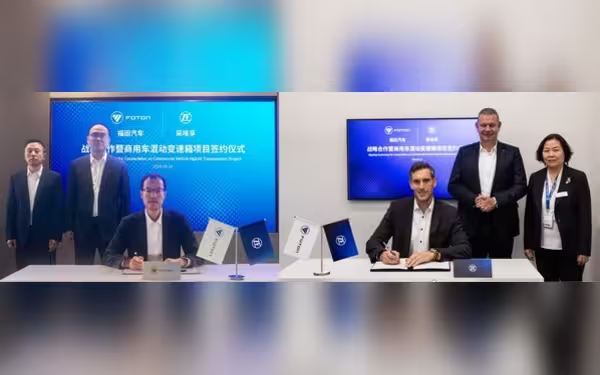Saturday, September 28, 2024 06:12 PM
Foton Motor and ZF Group Forge Hybrid Partnership for Sustainable Vehicles
- Foton Motor and ZF Group sign hybrid cooperation agreement.
- Joint venture to produce advanced hybrid drive systems in China.
- TraXon 2 Hybrid system enhances efficiency for commercial vehicles.
 Image Credits: en_prnasisa
Image Credits: en_prnasisaFoton Motor and ZF Group collaborate on hybrid technology for commercial vehicles, aiming for sustainability and efficiency in the automotive industry.
In recent years, the global automotive industry has been undergoing a significant transformation, particularly in the realm of commercial vehicles. As the world shifts towards greener and more sustainable energy solutions, companies are increasingly focusing on hybrid technologies. This shift is not just a trend; it is a necessity driven by environmental concerns and the need for efficiency in logistics and transportation.
On September 16, 2024, a notable development occurred at the 2024 Hannover International Commercial Vehicles Show. Foton Motor, a leading player in the automotive sector, and ZF Group, a renowned technology company, signed a strategic cooperation agreement. This agreement aims to introduce advanced hybrid drive systems for commercial vehicles into the Chinese market. The signing ceremony was attended by key figures, including Foton Motor's Chairman Chang Rui and ZF Group's Head of Commercial Vehicle Solutions, Peter Laier.
The collaboration between Foton Motor and ZF Group is built on their successful experience with the TraXon commercial vehicle automatic transmission and electric drive project. Together, they will establish a joint venture named ZF Foton Automatic Transmission (Jiaxing) Co., Ltd. This venture will hold exclusive technology licenses in China and will be responsible for producing innovative hybrid products.
One of the standout features of this partnership is the ZF TraXon 2 Hybrid system. This system is designed to maintain the performance advantages of traditional internal combustion engines while enhancing efficiency. This dual focus is expected to provide significant economic benefits to logistics companies and fleet operators, making operations more cost-effective.
Looking ahead, it is anticipated that by 2026, this innovative hybrid technology will achieve mass production in the Chinese market, marking a significant milestone in the industry. Professor Dr. Peter Laier emphasized the importance of this cooperation, stating, "The cooperation between ZF and Foton Motor can make full use of their respective resources and advantages to accelerate the development of our hybrid solutions and help to quickly and economically bring them to the Chinese and global markets."
Foton Motor's Chairman, Chang Rui, also highlighted the company's commitment to green and low-carbon energy solutions. He noted that the hybrid system is a crucial part of their strategy to advance the global commercial vehicle new energy industry. The signing of this agreement signifies a new phase in their collaboration, focusing on new energy and globalization.
As the automotive industry faces the challenges of new energy transformation, Foton Motor is actively pursuing three technical routes: pure electric, hybrid, and fuel cell technologies. This approach aims to strengthen their control over core modules and key technologies in the new energy sector. With the introduction of ZF's latest TraXon 2 Hybrid system, Foton Motor is not only enhancing its hybrid technology but also positioning itself at the forefront of the heavy-duty commercial vehicle hybrid market.
The partnership between Foton Motor and ZF Group represents a significant step towards a more sustainable future for commercial vehicles. As these companies work together to develop and implement advanced hybrid technologies, they are not only addressing the immediate needs of the market but also contributing to the broader goal of reducing carbon emissions and promoting environmental sustainability. This collaboration could very well set a precedent for future innovations in the automotive industry, paving the way for a greener tomorrow.













